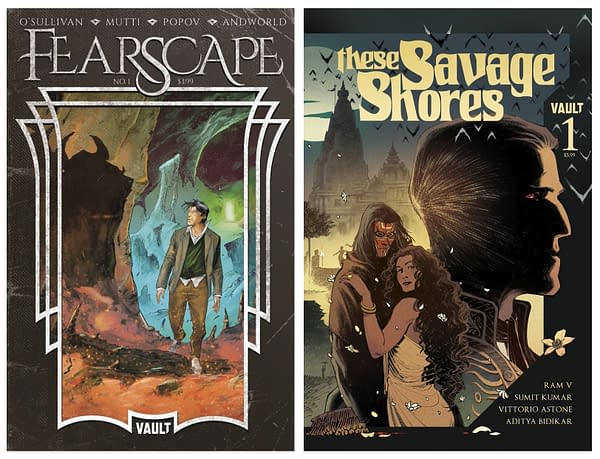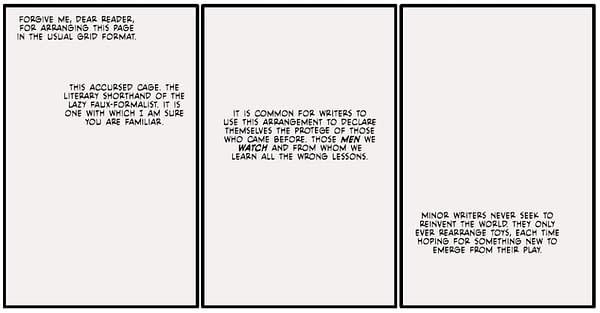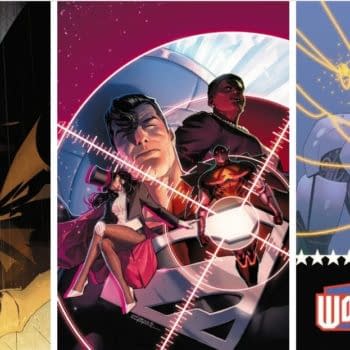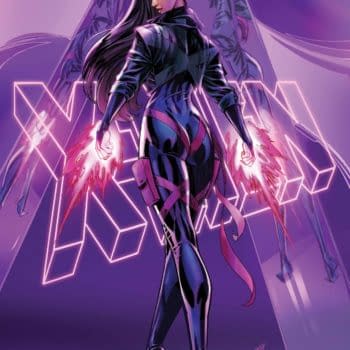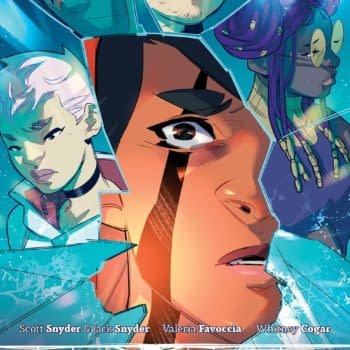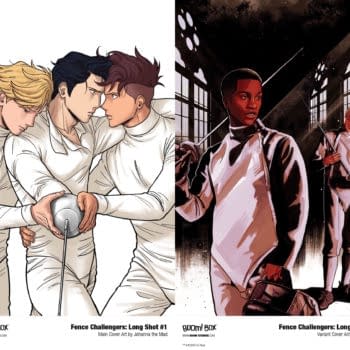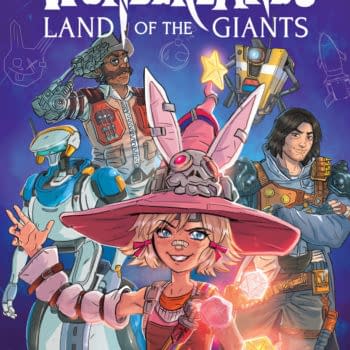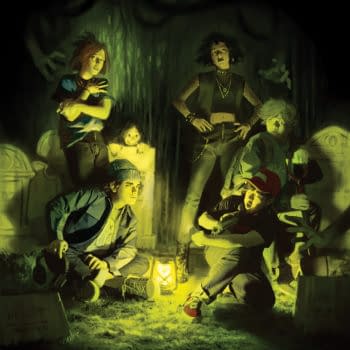Posted in: Comics, Recent Updates | Tagged:
Ryan O'Sullivan and Ram V Talk Fearscape, These Savage Shores, and Vault Comics
Having spoken to Bleeding Cool this time last year about their Image Comics debuts Void Trip and Paradiso, Ryan O'Sullivan and Ram V are back again. This time they discuss their new comic series Fearscape and These Savage Shores, being published in September and October this year as part of the newly forged partnership between Vault Comics and the UK-based writer studio White Noise.
RAM V: I love the inherently contradictory nature of both narrative and narrator in Fearscape. Your opening salvo is a nine panel grid, where in the third panel, your narration says, "Minor writers never seek to reinvent the world. They only ever rearrange the toys, each time hoping for something new to come from their play." A slight to 'minor' writers. And yet your narrator of choice is just that, a minor writer. A criticism of the overuse of narrative techniques in a medium and yet it is set to the backdrop of a nine panel grid. You decry the lack of originality, but your story begins in a bar.
Does Fearscape stand as a work of art in itself? Or is it entirely in reaction to other work? Is it a story by itself, or is it comics criticism as narrative? Do you have something to say or are you entirely reflecting on every creator's impostor syndrome?
RYAN O'SULLIVAN: Of course Fearscape stands alone! (L'art pour l'art!) The first issue is, however, deceptive in where it plants its flag. On the surface it appears to be a celebration of literature (it's not), a formalist critique of comics (it's not), and a burlesque of the hero's journey (it's not). Anyone who tells you that these surface-level attributes are what the story is saying, has made that most classical of errors: believing the unreliable narrator.
And what a narrator! Henry Henry is a translator who has never written a novel, yet still considers himself a Man of Letters. He discredits all authors who came before him as well as all his modern-day contemporaries, despite his prose style mimicking them. He opens the first issue promising the reader he is going to create the next great original novel devoid of the influence of his forebears…yet in the first issue we discover he is a plagiarist. He's telling the story of his journey into a magical realm populated by anthropological manifestations of different types of fears, escorted by The Muse, yet all of this fantasy worldbuilding plays second fiddle to his incessant neurosis-laden narration and the ego that comes with it. As you indicated above, the narrative and narration are, much like the protagonist, constantly at war with themselves. This allows for a tremendous number of red herrings and knight's moves.
As for the truth behind all this; I'll leave that up to the readers to discover. Many of my pre-release readers have suggested Henry Henry and I are aligned in our thinking. (Or, even worse, that Henry Henry is presented as an unreliable narrator so that I may invoke invective through him without any threat of recourse!) I'm not one to argue with readers, but to suggest that the "great idea" of Fearscape is Henry-Henry-as-author-insert is just patently false. Henry Henry is a character in a story; he doesn't reflect me anymore than Macbeth reflects Shakespeare. There may be occasions where my own dialogue patter or cognitive idiosyncrasies bleed into Henry Henry, but that says more about by limitations as a writer than my inspirations behind Fearscape's protagonist.
Interestingly, I feel that there's a degree of this at play in These Savage Shores, too. A dismissal of casual readers that is not all-too-dissimilar to Henry Henry's opening rhetoric in Fearscape. These Savage Shores is laden with subtle elements in the narration and art which rewards attentive reading. This is worlds apart from your earlier fantasy comic, Brigands, which was a very light and casual read. What prompted the shift? Are you channeling Henry Henry here?
RAM: Ha! I think you're reflecting more on your reading of my work, here. Nothing I do in my work is ever directly reactionary. I'm not particularly concerned with what category of reader is picking up my book. It might sound a little self-centered, but I create things purely because I find joy in creating them. What the reader draws from it, what it is perceived as almost never features in the thought process. At least, until the thing is made.
That said, if the work encourages and rewards readers who put in a little more in their reading of the story, it's because I read that way. I like stories that engage me that way and I like tell stories in a similar vein. These Savage Shores comes from a place of honesty rather than arrogance. Brigands, is simply its own thing. I wrote it because those are the stories that I gleefully consumed as a kid. There are subtleties there too. But These Savage Shores must carry the weight of history within its pages.
Digging more into that Fearscape contradiction I mentioned earlier, the only place you flip it around at little is when Henry Henry talks about being judged through the lens of past sensibilities. And yet Fearscape is full of references to literary classics– Blake, Petrarch, Shakespeare. You and I have had our discussions on classics and contemporary literature and their place and influence on the work. Henry Henry speaks against being judged by sensibilities past, and yet his narrative is influenced by almost reverent nostalgia. He looks down on his peers and eulogizes his influences. How much of this comes from you? If you are essentially writing about writing and your literary momentum is turned backward into all that has come before us, do you not worry about creating work that revels only in its own influences? How do you combat that, if at all you do? What does Fearscape have to say that's forward looking? That is new?
RYAN: Henry Henry doesn't have any conscious influences, and certainly none he eulogizes. He abhors classic literary greats just as much as he does contemporary ones. The real question here is whether I have any classical influences, and, if I do, whether they are bleeding into Fearscape. Unfortunately, I cannot confirm nor deny this, as to do so would reveal (or falsely indicate, and thus create conspiratorial disappointment) the direction of the story to the attentive reader. As Fearscape is predicated very much on knight's moves, at least upon the first reading, it would be self-defeating for me to give the game away in a pre-release media article. One of the most important things a writer discovers in the early days of their career is that their readers are just as intelligent as them, if not moreso.
I will say this, though: The classics are classics because (to butcher Calvino) they are books that have not stopped having something new to say. Classic authors touched the gods, and we, through them, experienced euphoria. I don't think ~60 years later that the bridge to heaven is now closed due to western culture developing an abhorrence towards adverbs, the passive voice, and verbosity. I think the modern writer has a duty to ignore his contemporaries, for they are drenched in the mindset of the now. It's like, I mean, nothing will date like, your work and stuff, if you, like, make it sound kinda current or whatever and junk, you know?
We cannot see the truth of contemporary fiction for we gaze upon it against the blinders of the zeitgeist. Our children will make sense of it, but it is beyond the remit of our senses and our cognition. All that is left to us is the classics. We know the historical stylings of the modernists or the romantics or the beat generation. We can read them and comprehend them fully because we are able to strip away their lit history milieu until only the timeless truth remains. That timeless truth at the core of them that still talks to us today, and that is forever "new".
Now, I've always said your comics work reads like prose. This has become more apparent with your latest releases. Your work has become…denser? More narration on the page. Prose intersecting with imagery to create dual narratives. I like it. It feels like a melting pot of your contemporary filmic/authorial influences, with just enough anachronistic verbiage to set the tone. Of all your work, These Savage Shores is the best example of your newfound density. You bookend the first issue with two letters. Why this approach? And what role do you see letters, and the denser more prose-like elements of your evolving writing style, playing in the comic as the story unfolds?
RAM: I think we had a chat about this at some ungodly hour on the last day of Thoughtbubble 2017? I don't really see it as a newfound density, just the evolution of a writer trying to find his voice. It is one of those nebulous things where you're trying to find a style, a tenor that is uniquely you. So, the density you see is probably, at least in part, a result of that. It helps that These Savage Shores also comes from a deeply personal place. I have an instinctive understanding of how I want it to feel.
The letters and journals are an obvious nod to Stoker, of course. But I part of the reason I love comics is that it allows you to layer narrative in a way that other mediums don't. It is a medium of juxtaposition. And, letters and journals allow me to add a layer of juxtaposition to the existing narrative. There is the linear juxtaposition of images. Then that of text and images. Now, with letters, we add a juxtaposition of time. Letters move away from the immediacy of the moment and allow you to talk about things outside of the here and now. The visuals can be designed to root you in the moment. It's a great tool to work with, that kind of displacement. It lets me do things with a degree of subtlety that would otherwise be hard to achieve.
RYAN: I adore high word counts. So many readers laud the dense narrative style of Moore, Gaiman, and other Britwave writers from the '80s and '90s. Yet the contemporary comicsphere remains wholly focused on pop/geek culture reference, meta commentary, and comics defined (and appreciated) almost entirely on the high concept. "An extremely well told story" isn't a sexy headline, but it's the one that, to me, most accurately describes These Savage Shores. Do you feel like you're taking a risk by writing such a dense, subtle, narrative-driven, comic? Especially in the current comics climate?
RAM: "An extremely well-told story." Isn't a sexy headline. Isn't it just a fundamental requirement of a good story? Ideas are great. But having an idea isn't the same as having a story. And having a story isn't the same as writing it well. If anything, that irks me more. Seeing a good idea being done poorly.
As far as comics being full of geek and pop-culture references. It's a natural consequence of a much more interesting and wider cultural phenomenon. One of cultural paucity. We're not living in the future we were promised. We don't have jetpacks, we're not teleporting to work and not warp-speeding to new galaxies. Instead we have one-click shopping, 24-hour cable, and info-tainment. Creating cultural momentum took a backseat to consuming it. And in the wake of that underwhelming reality, we seem to be turning back to an era when narratives were still full of hope. When postmodernism was still novel and UFO sightings were a thing.
I'm reminded of a George Saunders talk on Story. Where he insists the world just as inspiring and interesting as it has always been. But we need to go out and see it. Truly observe and make an effort to find the places where good stories come from. Every new story is a risk. As it should be. If I'm not taking risks, I'm telling you something you've already heard. And that is boring. And writers may be forgiven all follies — all but the sin of being boring.
Let's talk about the page in Fearscape where The Muse makes her first appearance. You and Derron are doing clever things there with caption placements and lettering. I'm fascinated. Walk us through your thought process there.
RYAN: My thought process was that Henry Henry, devout narcissist, is incapable of finding anything other than his own thoughts beautiful. To the extent that, when faced with an anthropological manifestation of the platonic form of beauty, he is more concerned with his own ability to express it accurately than he is the thing itself.
A large part of the conception of Fearscape was me playing with the golden rule of comics; never write in the narration what is already shown in the art. And while Fearscape absolutely follows this rule, it does it to such an extent that the art and narration are actively fighting each other through caption placement. There is a story there, despite Henry Henry's best attempts to keep the reader from it. The fact that Andrea and Vlad provide such beautiful art for the narration to fight with makes the conflict between the narration and the art all the more tragic.
Forgive me for mimicking the mating call of every comic critic in existence, but whilst we're on the subject I wanted to ask about some of the sequential storytelling techniques you've been favouring of late. I'm talking specifically about your use of narration-over-montage. You have these grandiose mythical passages of prose layered over symbolic imagery to create powerful dual narratives, which you usually follow up with a small character moment. I first noticed this contrast of the big-and-small in the second arc of PARADISO, and now I can see it all over THESE SAVAGE SHORES. What draws you to this style of storytelling? It's an interesting mixture of prose and filmic technique.
RAM: You're a huge fan of manga. They've been using that technique for ages. It's not always paired that way. With the grand narrative being punctuated by quiet moments of character. That's something I probably do. But the technique of layering narration over aspect or subject transitions is very common in manga. I don't particularly see it as a filmic technique but I'm using the Kuleshov effect borrowed from there, which I gather is why you mention montages.
As for following up grand narratives with quieter character moments, I do it for balance and rhythm. It's easy to get carried away with world building or to enamour readers with grand events. But people stay for characters. There must be something at stake for someone relatable. There must be true and tangible catharsis and change– at least the promise of it. And it becomes impossible to convey that if you're not willing to turn down the volume on everything else and sit down with your character and let them make actual choices.
So then why do we follow Henry Henry in Fearscape? He's a thief, an impostor, not very likeable, insufferably vain and frankly, bordering on despicable. But he is compelling. Why? How'd you manage that? Where's that balance between finding a character likeable v/s finding a character compelling?
RYAN: Why does anyone enjoy reading a story with an unreliable narrator? (More to the point, why would anyone believe the interview answers of a writer who clearly enjoys playing with his readers?)
One aspect of unreliable narration that I enjoy is the freedom it gives you with you protagonist. Because the bond is between author and reader, rather than protagonist and reader, you are free to create the most detestable character imaginable. (The irony here being that Henry Henry acts as a sort of pseudo-author via his narration, and believes he is building a relationship with the reader through flowery prose and promises of a happy future together. In a strange way, Henry Henry is competing with myself, Vlad, Andrea, and Derron for the reader's interest.)
In a more general sense, I've never been one for likeable characters. A tabula rasa that the audience can imprint upon feels too rote in 2018. What first attracted me to comics was the Vertigo imprint at DC Comics in the '80s and '90s. That counter-culture subversion within a fringe medium from writers and artists who took their inspiration from outside of comics. You had characters like Spider Jerusalem, Enigma, and V. Now, some twenty-five years on, you have a readership familiar with obscure ideas, locations, and characters. We can afford to try new things. Frodo Baggins no longer need carry the torch for us. Let him lest his tiny feet. Irreverent characters such as Deadpool are happy to take his place.
New characters aren't the only thing 2018 Western readers are growing accustomed to, but new places as well. These Savage Shores is your first comic since BLACK MUMBA that is based in India. I find this interesting for a few reasons. The first is the obvious hot topic – diversity. India isn't a country represented in comics all that much. (I'm reasonably sure you're the first Indian writer to pen BATMAN.) Comics, especially those sold in the direct market, have a very Western feel to them. It's refreshing to see you bring Eastern culture to it. The second reason this struck me, is because it gets into that whole "write what you know" argument. I'm a big proponent of the idea that it is the job of the writer to recreate the world in their work. And, to do this with any degree of accuracy, said writer must know the world. (Or else they risk just echoing their favorite authors or, even worse, writing-stories-about-writing.) What are your thoughts on this?
RAM: You forgot GRAFITY'S WALL! But I take your point. Yeah diversity is important to me. I've spoken about it before. The kind of effect it can have, at a young age, for someone to find themselves represented in a book. I grew up in India, reading mostly American, British or European writing. Even a lot of the Indian writing at the time was heavily influenced by its colonial history. My generation was really the first to grow up at a safe distance from that colonial history. I mean, my dad was born two years before India gained its independence. So yeah, I feel strongly about diversity and representation. But I don't stop there. I find lip-service insulting. I want diversity in stories as well. I want diversity in characters. I want Indian, Asian, black, LGBTQ characters in movies and books but if you're only ever going to write them as stereotypes, that's the kind of failure that misses the whole point of the exercise. Which is where I clarify that I don't mean to say that writers should not be writing characters outside of their cultural understanding, I mean to say that writers should be striving to ever expand the boundaries of their cultural limitations. You need to evolve as a person to be able to evolve as a writer.
I don't see it as much as writers recreating the world in their work as writers chronicling the world in their work. Or as Coetzee would say, attempting to tame a part of the world through your work. So, it behooves every writer to start thinking of the world as this chaotic and fluid place where nothing is ever a predictable stereotype.
I think you might be right about me being the first Indian writer to be penning a Batman story, which is very exciting. But, I'm even more encouraged to know that it was the editors reading Black Mumba that made them first take interest in my work. It gives me joy to think that these characters that are quintessentially American creations now truly belong to the world.
Speaking of characters, are you Henry Henry, Ryan Ryan? Is Henry Henry the embodiment of all the writing you dislike?
RYAN: Do Henry Henry's thoughts align with my own? I leave that up to the reader to decide. To some he is a smoke screen that allows me to spew vitriol on behalf of my own personal petty grievances, but to other, more attuned, readers, he is simply a reasonable perspective taken to unreasonable extremes through dramatic hubris.
Let us address the elephant in the room; Fearscape opens with a polemic against the nine panel grid. These Savage Shores is written entirely on the nine-panel grid. Why did you defy me? Is this some sort of bid for my position as leader of White Noise?
RAM: You might recollect, These Savage Shores was conceptualized long before you started writing Fearscape. In fact, we spoke about my intention to use density and the nine panel grid before you started working on the book. So, if anything, Fearscape is entirely in reaction to my work. And, as always, it's good to see that as leader of White Noise I continue to inspire the best in you.
FEARSCAPE #1 is in stores September 26th. THESE SAVAGE SHORES #1 is in comic stores October 10th.


